Looking for courses that include curriculum about accessibility? Start here – but do check the UW course catalog, MyPlan, and the department course listings to confirm when courses are taught and by whom.
CSE 340 – Interaction Programming »
- Accessibility assignment and related learnings
User interfaces for computing systems, including principles and implementation techniques. Covers key topics and programming paradigms for interactive systems, such as event handling; graphical layout, design, and widgets; undo; accessibility; and context awareness. Provides experience with modern application domains and frameworks (e.g., mobile applications).
Quarter: Autumn 2023
CSE 440 – Introduction to HCI »
- Lecture on accessibility
Human-Computer Interaction (HCI) theory and techniques. Methods for designing, prototyping, and evaluating user interfaces to computing applications. Human capabilities, interface technology, interface design methods, and interface evaluation tools and techniques. Prerequisite: CSE 332.
Instructor: Amy Zhang
Prerequisite: CSE 332
Quarter: Autumn 2023
CSE 482 – Capstone Software Design to Empower Underserved Populations »
Students work in teams to design and implement a software project involving multiple areas of the CSE curriculum, for the purpose of empowering marginalized or underserved populations.
Quarter: Not currently offered
Course details in MyPlan (UW ID required)
CSE 493e – Accessibility
Starting Autumn 2023, CSE 493e – Accessibility will explore how computing can enable new solutions to accessibility, including both access to the world and access to computers. Similarly, the course will investigate how a disability-led perspective can guide us in the development of empowering and relevant solutions to accessibility problems. Both topics will be addressed through a combination of discussions, reading, and building.
Instructors: Jen Mankoff and Venkatesh Potluri
Quarter: Autumn
CSE 513e – Disability Inclusion & Accessibility for Technologists »
A new (in Spring 2024) breadth class for CSE graduate students, the project-based course explores new solutions to accessibility through computing. Students take a disability studies perspective and gain valuable insights into the future of all user interface technology. The course includes creating accessible documents, websites and apps; accessibility in fabrication; AR/VR and AI/ML, and looks at intersectional concerns such as healthcare and sustainability.
Instructor: Jennifer Mankoff, TA Aashaka Desai
Quarter: Spring
CS course description | UW course catalog
CSE 590w – Accessibility Research Seminar »
The seminar is for students and faculty members to explore research in accessible computing for people with disabilities in the context of human-computer interaction (HCI). The seminar consists of short student presentations of current research results, followed by discussion and critical evaluations the research. Topics vary by quarter.
Instructor: various CREATE graduate students
Quarter: Autumn, Winter, Spring
CREATE description | CS course description | time schedule (UW ID required)
DISST – Disabilities Studies courses »
Disability Studies is a multi-disciplinary field that investigates, critiques, and enhances Western society’s understandings of disability.
Disabilities Studies course descriptions | UW course catalog
DISST 332 – Disability & Society: A Focus on Community and the Outdoors »
A community partnership with the Outdoors For All Foundation, the service learning course focuses on disability, community, and play in the outdoors and seeks to provide students with a place to learn about Disability Studies in Education in applied contexts. Students serve as volunteer ski instructors, get to know the program participants’ individual strengths and limitations, then assist by adjusting bindings, giving tips and encouragement, and talking over support strategies with family members.
Instructor: Jason Naranjo, UW Bothell
Quarter: not currently scheduled
Cross-listed on UW Bothell and Seattle campuses
Course flyer | Course description in MyPlan | UW News article
Gen St 297 – Disability 101: Identity, Education, Careers, & Leadership »
Small-group discussion with faculty representing a wide spectrum of academic disciplines. Topics include faculty’s research techniques or findings, concentrated reading in his/her area of interest, or illustrated problems and alternative related to the study of a particular academic discipline. Class structure varies based on instructor.
Instructor: Scott Bellman, Sheryl Burgstahler
Quarter: Autumn, Winter, Spring, Summer
HCDE 315 – Inclusive Design and Engineering »
Surveys a range of methods that examine, support, and interrogate design and engineering for disability and inclusivity. Students enact inclusive methods, reflect on their capacities to broaden design and engineering goals, and critique and evaluate their effectiveness from a variety of perspectives.
Instructor: Sarah Coppola
Quarter: Not currently offered
Prerequisite: none
HCDE Directed Research Group »
Students in the Tactile Graphics Directed Research Group (Spring 2023) work on teams to develop workflows for tactile graphics. In this showcase, view demos of hardware and software solutions for low-cost Blind and Low Vision making and tactile biomechanics diagrams.
Quarter: Autumn 2023
Prerequisite: Permission of instructor
HCDE 515 – Accessibility and Inclusive Design »
Introduction to designing, prototyping, and evaluating inclusive user interfaces that meet the needs of a diverse range of users – such as older adults; users with visual, cognitive or motor disabilities; and users who are deaf or hard of hearing. Building on basic concepts in human-centered design, students will learn about design exclusion and barriers to use, and methods by which these can be overcome.
Instructor: Leah Findlater
Quarter: Not currently offered
Prerequisite: HCDE 518
INFO 498 – Special Topics in Informatics: Accessibility »
Making the world and its information accessible can be crucial for supporting independent living and providing equal access to the information-rich world for millions of people. This class will cover concepts related to inclusive design, why accessibility is important, what access technologies already exist, and how to make interfaces and technologies accessible. Through a combination of readings, hands-on exercises, and an open-ended project, students will learn about the history and existing state of accessibility, where its future might be, and how to apply its principles and guidelines in practice.
Instructor: Junhan “Judy” Kong
Quarter: Spring 2024
ITA 340 – Introduction to Web Publishing »
- Includes the Web Accessibility Initiative
Introduction to markup languages and publishing web content. Students gain understanding of HTML coding and extensions, image manipulation, information architecture, and web site publishing. Includes the Web Accessibility Initiative.
Instructor: iSchool
Quarter: Not currently offered
ITA 341 – Client-side Scripting and Design »
Introduction to web browser design environment, scripting languages, JavaScript, Document Object Model, and creation of dynamic HTML web pages in combination with Cascading Style Sheets. Includes client-server architecture and web design principles in the contexts of technical feasibility, usability, and accessibility.
Instructor: iSchool
Quarter: Not currently offered
ME 412 – Biomechanics of Movement »
Introduction to the dynamics and control of human movement and other biological systems. An overview of the major challenges in movement biomechanics and experience with the engineering tools we use to address these challenges. Course includes weekly assignment, hands-on labs, and a final project.
Instructor: Kat Steele
Quarter: Winter
Prerequisites: ME 374 or permission
HCID 501 – Immersion Studio
A five-day intensive workshop that orients students to core ideas and terminology in HCI and design, provide some key skills that will be instrumental in success in a studio learning environment, and provide students with a intriguing portfolio story worth talking about with industry professionals.
Instructor: Ana Maria S.V. Pinto da Silva
Quarter: Autumn
Prerequisites: MHCID major
PMP – Future of Access Technologies »
Accessible technologies are at the forefront of technological innovation in a changing society. This class covers these cutting edge technologies, teaches thinking about access and inclusion, and looks at some of the history and critical theory around disability. Primarily, this is a class to build in, and we will learn about physical access technology using Arduinos and fabrication tools as well as software access technology. This is a graduate class with a fairly open-ended project at the end.
Instructor: Jen Mankoff
Quarter: varies
Prerequisites: comfort with programming, new languages
Related news
Anat Caspi receives Human Rights Educator Award
Congratulations to Anat Caspi on receiving the 2023 Human Rights Education Award from the Seattle Human Rights Commission!
Caspi is a CREATE associate director and the founder and director of the Taskar Center for Accessible Technology. About the award she said, “I have always thought making an impact on local communities is where it starts,” said Caspi. “The Seattle commission’s focus on disability rights as civil rights serve as a reminder of the importance of collaborative efforts in creating a more inclusive and just society.” She emphasized that it also celebrates the collective efforts of the Taskar Center community.
Those efforts range from the expansive — mapping the accessibility of miles of urban infrastructure — to those of a more human scale. For example, the Taskar Center partnered with not-for-profit Provail Therapy Center to create a library of adapted technology for people with different abilities to borrow for free. The 800 artifacts in the Pacific Northwest Adaptive Technology Library were either donated or created through community education events, where volunteers don protective goggles and get a crash-course in safe use of a soldering iron before adapting battery-operated toys to be switch-accessible for players of different abilities.
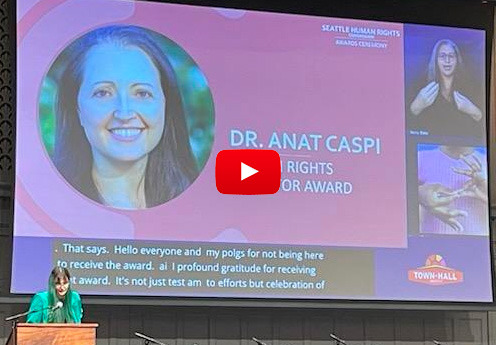
Watch as Olivia Quesada accepts the award on Caspi's behalf at the ceremony.
Augmented Reality to Support Accessibility
October 25, 2023
RASSAR – Room Accessibility and Safety Scan in Augmented Reality – is a novel smartphone-based prototype for semi-automatically identifying, categorizing, and localizing indoor accessibility and safety issues. With RASSAR, the user holds out their phone and scans a space. The tool uses LiDAR and camera data, real-time machine learning, and AR to construct a real-time model of the 3D scene, attempts to identify and classify known accessibility and safety issues, and visualizes potential problems overlaid in AR.
RASSAR researchers envision the tool as an aid in the building and validation of new construction, planning renovations, or updating homes for health concerns, or for telehealth home visits with occupational therapists. UW News interviewed two CREATE Ph.D. students about their work on the project:
Research at the Intersection of Race, Disability and Accessibility
October 13, 2023
What are the opportunities for research to engage the intersection of race and disability?
What is the value of considering how constructs of race and disability work alongside each other within accessibility research studies?
Two CREATE Ph.D. students have explored these questions and found little focus on this intersection within accessibility research. In their paper, Working at the Intersection of Race, Disability and Accessibility (PDF), they observe that we’re missing out on the full nuance of marginalized and "otherized" groups.
The Allen School Ph.D. students, Aashaka Desai and Aaleyah Lewis, and collaborators will present their findings at the ASSETS 2023 conference on Tuesday, October 24.
Spurred by the conversation at the Race, Disability & Technology research seminar earlier in the year, members of the team realized they lacked a framework for thinking about work at this intersection. In response, they assembled a larger team to conduct an analysis of existing work and research with accessibility research.
The resulting paper presents a review of considerations for engaging with race and disability in the research and education process. It offers analyses of exemplary papers, highlights opportunities for intersectional engagement, and presents a framework to explore race and disability research. Case studies exemplify engagement at this intersection throughout the course of research, in designs of socio-technical systems, and in education.
Case studies
- Representation in image descriptions: How to describe appearance, factoring preferences for self-descriptions of identity, concerns around misrepresentation by others, interest in knowing others’ appearance, and guidance for AI-generated image descriptions.
- Experiences of immigrants with disabilities: Cultural barriers that include cultural disconnects and levels of stigma about disability between refugees and host countries compound language barriers.
- Designing for intersectional, interdependent accessibility: How access practices as well as cultural and racial practices influence every stage of research design, method, and dissemination, in the context of work with communities of translators.

Authors, left to right: Christina Harringon, Aashaka Desai, Aaleyah Lewis, Sanika Moharana, Anne Spencer Ross, and Jennifer Mankoff Authors
- Christina N. Harrington, Assistant Professor in the Human-Computer Interaction Institute at Carnegie Mellon
- Aashaka Desai, Ph.D. student in the Allen School, advised by Jennifer Mankoff and Richard Ladner
- Aaleyah Lewis, Ph.D. student in the Allen School, advised by James Fogarty
- Sanika Moharana, Ph.D. student at Carnegie Mellon
- Anne Spencer Ross, Assistant Professor of Computer Science at Bucknell University
- CREATE Director Jennifer Mankoff
Quarterly Seminar on Accessibility
The CREATE Accessibility Seminar, CSE 590w - Accessibility Research, brings students and faculty together to explore a variety of topics relating to accessibility and technology.
Spring 2024
Spring seminars consist of short research presentations by students and affiliates, followed by discussion and critical evaluations.
Mondays, 3:30-4:30 p.m. starting April 1, 2024
Remote over Zoom- To participate and earn 1 credit, register for CSE 590w - Accessibility Research. If you need an add code, message Aashaka Desai or Gina Clepper.
- To participate without earning credit, join the seminar mailing list. No need to register; same form as previous quarters.
- Please complete Accessibility needs form as soon as possible.
- For more information, contact the student leads, Aashaka Desai or Gina Clepper.
Monday Making - DIY Accessible Technology
CREATE is hosting Monday Making events on Mondays at 4:30 in CSE II 283 lab. Stay with us after seminar this quarter to see what the level of interest is in thinking about, and creating, various forms of DIY Accessible Technology (DIYAT) and related technologies. The space has (and is acquiring) a variety of lightweight making equipment and accessibility equipment, such as an embroidery machine, swell paper printer, a few 3D printers. The lab is configured for soldering as well. Hope to see you there!
Past topics
- Autumn 2023: Alice Wong's Year of the Tiger: An Activist’s Life
- Autumn 2022: Keah Brown's The Pretty One: On Life, Pop Culture, Disability, and Other Reasons to Fall in Love with Me
- Winter 2021: graduate student research reports
- Autumn 2021: Margaret Price's MAD at School
- Autumn 2020: research in the intersection of disability and race, primarily focusing on under-represented minorities
CREATE's Newest Ph.D Graduates
June 9, 2023
We're proud to see these talented, passionate students receive their Ph.D.s and excited to see how they continue their work in accessibility.
Alyssa Spomer, Ph.D. Mechanical Engineering
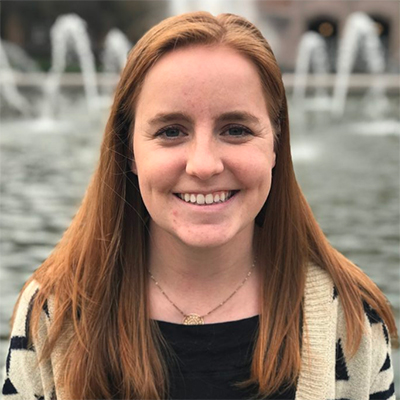
Dissertation: Evaluating multimodal biofeedback to target and improve motor control in cerebral palsy
Advisor: Kat Steele
Honors, awards and articles:
- NSF Graduate Research Fellowship and TL1 Fellowship
- Husky 100 in 2020
- Mechanical Engineering feature article Supporting Mobility in Cerebral Palsy
- HuskyADAPT Student Chair
Current: Clinical Scientist at Gillette Children's Hospital, leading research in the Gillette Rehabilitation Department to improve healthcare outcomes for children with complex movement conditions.
Elijah Kuska, Ph.D. Mechanical Engineering
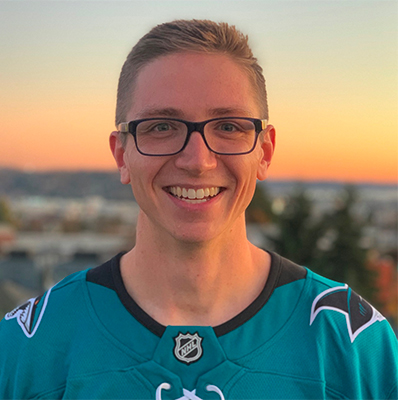
Dissertation: In Silico Techniques to Improve Understanding of Gait in Cerebral Palsy
Advisor: Kat Steele
Honors, awards and articles:
- TL1 Fellowship
- Mechanical Engineering article Making an impact through research and teaching
Plans: Elija will start as an assistant professor at the Colorado School of Mines in the Mechanical Engineering Department in January 2024.
Megan Ebers, Ph.D. Mechanical Engineering
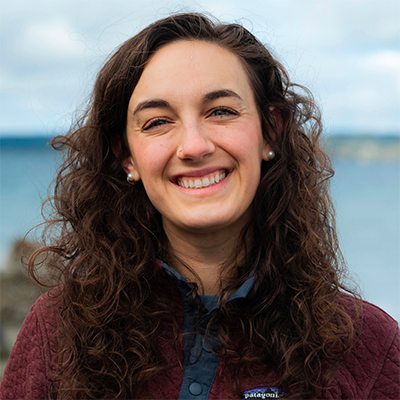
Dissertation: Machine learning for dynamical models of human movement
Advisors: Kat Steele and Nathan Kutz
Awards, honors and articles:
- Dual Ph.D.s in Mechanical Engineering and Applied Math
- NSF Graduate Research Fellowship
Plans: Megan will join the UW AI Institute as a postdoc in Spring of 2023 to pursue clinical translation of her methods to evaluate digital biomarkers to support health and function from wearable data.
Nicole Zaino, Ph.D. Mechanical Engineering
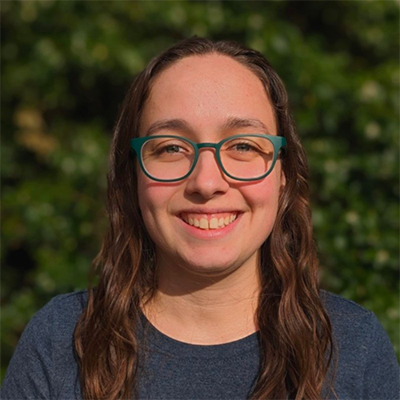
Dissertation: Walking and rolling: Evaluating technology to support multimodal mobility for individuals with disabilities
Advisors: Kat Steele and Heather Feldner
Awards, honors and articles:
- National Science Foundation Graduate Research Fellow, 2018 - Present
- Gatzert Child Welfare Fellowship, University of Washington, 2022
- Best Paper Award at the European Society of Movement Analysis for Adults and Children, 2019.
- Finalist, International Society of Biomechanics David Winter Young Investigator Award, 2019
Plans: Nicole is headed to Bozeman Montana to join the Crosscut Elite Training team to work toward joining the national paralympic nordic ski team for Milano-Cortina 2026, while working part-time with academia and industry partners.
Ricky Zhang
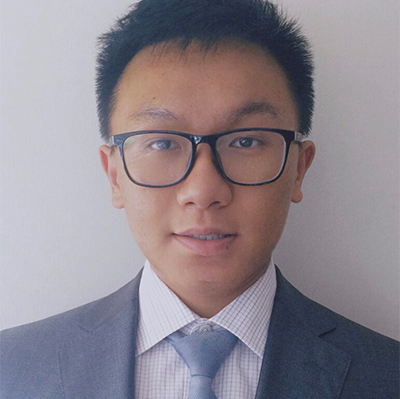
Dissertation: Pedestrian Path Network Mapping and Assessment with Scalable Machine Learning Approaches
Advisors: Anat Caspi and Linda Shapiro
Plans: Ricky will be a postdoc in Bill Howe’s lab at the University of Washington.
Kat Steele, who has been busy advising four out of five of these new PH.D.s, noted, "We have an amazing crew of graduate students continuing and expanding upon much of this work. We're excited for new collaborations and translating these methods into the clinic and community."